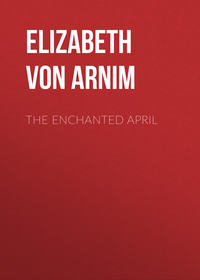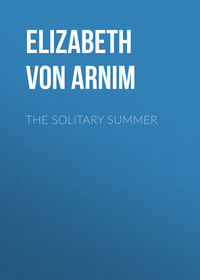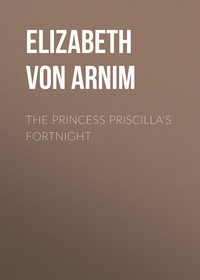 полная версия
полная версияChristine
"I not only take the greatest interest in you, charming young lady, and in your country, but I have an orderly mind and would be really pleased to see those corners straightened out. Use your influence, which I am sure must be great, with that shortsighted body of gentlemen, your County Council."
"I shall not fail," I said, more politely than ever, "to inform them of your wishes."
"Ah, but she is delightful,—delightful, your little Englanderin," he said gaily to Frau Bornsted, who listened to his badinage with grave and respectful indulgence; and he said a lot more things about England and its products and exports, meaning compliments to me—what can he be like after dinner?—and went off, jovial to the last, clicking his heels and kissing first Frau Bornsted's hand and then mine, in spite, as he explained, of its being against the rules to kiss the hand of a junges Madchen, but his way was never to take any notice of rules, he said, if they got between him and a charming young lady. And so he went off, waving his green hat to us and calling out Auf Wiedersehen till the forest engulfed him.
Herr von Inster and the Graf went too, but quietly. The Graf went exceedingly quietly. He hadn't said a word to anybody, as far as I could see, and no rallyings on the part of the Colonel could make him. He didn't even react to being told what I gather is the German equivalent for a sly dog.
Herr von Inster said, when he could get a word in, that he is coming over to-morrow to drive me about the forest. His attitude while his Colonel rattled on was very interesting: his punctilious attention, his apparent obligation to smile when there were sallies demanding that form of appreciation, his carefulness not to miss any indication of a wish.
"Why do you do it?" I asked, when the Colonel was engaged for a moment with the Oberforster indoors. "Isn't your military service enough? Are you drilled even to your smiles?"
"To everything," he said. "Including our enthusiasms. We're like the claque at a theatre."
Then he turned and looked at me with those kind, surprising eyes of his,—they're so reassuring, somehow, after his stern profile—and said, "To-morrow I shall be a human being again, and forget all this,—forget everything except the beautiful things of life."
Now I must leave off, because I want to iron out my white linen skirt and muslin blouse for to-morrow, as it's sure to be hot and I may as well look as clean as I can, so good-bye darling little mother. Oh, I forgot to say how glad I am you like being at Glion. I did mean to answer a great many things in your last letter, my little loved one, but I will tomorrow. It isn't that I don't read and reread your darling letters, it's that one has such heaps to say oneself to you. Each time I write to you I seem to empty the whole contents of the days I've lived since I last wrote into your lap. But to-morrow I'll answer all your questions,—to-morrow evening, after my day with Herr von Inster, then I can tell you all about it.
Good-bye till then, sweet mother.
Your Chris.
Koseritz, Saturday evening, July 18, 1914
My darling little mother,
See where I've got to! Who'd have thought it? Life is really very exciting, isn't it. The Grafin drove over to Schuppenfelde this afternoon, and took me away with her here. She said Kloster was coming for Sunday from Heringsdorf to them, and she knew he would want to see me and would go off to the Oberforsterei after me and leave her by herself if I were at the Bornsteds', and anyhow she wanted to see something of me before I went back to Berlin, and I couldn't refuse to give an old lady—she isn't a bit old—pleasure, and heaps of gracious things like that. Herr von Inster had brought a note from her in the morning, preparing my mind, and added his persuasions to hers. Not that I wanted persuading,—I thought it a heavenly idea, and didn't even mind Helena, because I felt that in a big house there'd be more room for her to stare at me in. And Herr von Inster is going to stay another week, taking his summer leave now instead of later, and he says he will see me safe to Berlin when I go next Saturday.
So we had the happiest morning wandering about the forest, he driving and letting the horses go as slowly as they liked while we talked, and after our sandwiches he took me back to the Bornsteds, and I showed Frau Bornsted the Grafin's letter.
If it hadn't been a Koseritz taking me away she would have been dreadfully offended at my wanting to go when only half my fortnight was over, but it was like a royal command to her, and she looked at me with greatly increased interest as the object of these high attentions. She had been inclined to warn me against Herr von Inster as a person removed by birth from my sphere—I suppose that's because I play the violin—and also against drives in forests generally if the parties were both unmarried; and she had been extraordinarily dignified when I laughed, and had told me it was all very well for me to laugh, being only an ignorant junges Madchen, but she doubted whether my mother would laugh; and she watched our departure for our picnic very stiffly and unsmilingly from the porch. But after reading the Grafin's letter I was treated more nearly as an equal, and she became all interest and co-operation. She helped me pack, while Herr von Inster, who has a great gift for quiet patience, waited downstairs; and she told me how fortunate I was to be going to spend some days with Komtesse Helena, from whom I could learn, she said, what the real perfect junges Madchen was like; and by the time the Grafin herself drove up in her little carriage with the pretty white ponies, she was so much melted and stirred by a house-guest of hers being singled out for such an honour that she put her arm round my neck when I said good-bye, and whispered that though it wasn't really fit for a junges Madchen to hear, she must tell me, as she probably wouldn't see me again, that she hoped shortly after Christmas to enrich the world by yet one more German.
I laughed and kissed her.
"It is no laughing matter," she said, with solemn eyes.
"No," I said, suddenly solemn too, remembering how Agatha Trent died.
And I took her face in both my hands and kissed her again, but with the seriousness of a parting blessing. For all her dignity, she has to reach up to me when I kiss her.
She put my hair tidy with a gentle hand, and said, "You are not at all what a junges Madchen generally is, but you are very nice. Please wish that my child may be a boy, so that I shall become the mother of a soldier."
I kissed her again, and got out of it that way, for I don't wish anything of the sort, and with that we parted.
Meanwhile the Grafin had been sitting very firmly in her carriage, having refused all Frau Bornsted's entreaties to come in. It was wonderful to see how affable she was and yet how firm, and wonderful to see the gulf her affability put between the Bornsteds—he was at the gate too, bowing—and herself.
And now here I am, and it's past eleven, and my window opens right on to the Haff, and far away across the water I can see the lights of Swinemunde twinkling where the Haff joins the open sea. It is a most beautiful old house, centuries old, and we had a romantic evening,—first at supper in a long narrow pannelled room lit by candles, and then on the terrace beneath my window, where larkspurs grow against the low wall along the water's edge. There is nobody here except the Koseritzes, and Herr von Inster, and two girl-friends of Helena's, very pretty and smart-looking, and an old lady who was once the Grafin's governess and comes here every summer to enjoy what she called, speaking English to me, the Summer Fresh.
It was like a dream. The water made lovely little soft noises along the wall of the terrace. It was so still that we could hear the throb of a steamer far away on the Haff, crossing from Stettin to Swinemunde. The Graf, as usual, said nothing,—"He has much to think of," the Grafin whispered to me. The girls talked together in undertones, which would have made me feel shy and out of it if I hadn't somehow not minded a bit, and they did look exactly what the Colonel had said they were, in their pale evening frocks,—a nosegay of very delicate and well cared-for hothouse flowers. I had on my evening frock for the first time since I left England, and after the weeks of high blouses felt conspicuously and terribly overdressed up in my bedroom and till I saw the frocks the others had on, and then I felt the exact opposite. Herr von Inster hardly spoke, and not to me at all, but I didn't mind, I had so much in my head that he had talked about this morning. I feel so completely natural with him, so content; and I think it is because he is here at Koseritz that I'm so comfortable, and not in the least shy, as I was that day at luncheon. I simply take things as they come, and don't think about myself at all. When I came down to supper to-night he was waiting in the hall, to show me the way, he said; and he watched me coming down the stairs with that look in his eyes that is such a contrast to the smart, alert efficiency of his figure and manner,—it is so gentle, so kind. I went into the room where they all were with a funny feeling of being safe. I don't even know whether Helena stared.
To-morrow the Klosters come over, and are going to stay the night, and to-morrow I may play my fiddle again. I've faithfully kept my promise and not touched it. Really, as it's a quarter to twelve now and at midnight my week's fasting will be over, I might begin and play it quite soon. I wonder what would happen if I sat on my window-sill and played Ravel to the larkspurs and the stars! I believe it would make even the Graf say something. But I won't do anything so unlike, as Frau Bornsted would say, what a junges Madchen generally does, but go to bed instead, into the prettiest bed I've slept in since I had a frilly cot in the nursery,—all pink silk coverlet and lace-edged sheets. The room is just like an English country-house bedroom; in fact the Grafin told me she got all her chintzes in London! It's so funny after my room at Frau Berg's, and my little unpainted wooden attic at the Oberforsterei.
Good night, my blessed mother. There are two owls somewhere calling to each other in the forest. Not another sound. Such utter peace.
Your Chris.
Koseritz, Sunday evening, July 19, 1914
My own darling mother,
I don't know what you'll say, but I'm engaged to Bernd. That's Herr von Inster. You know his name is Bernd? I don't know what to say to it myself. I can't quite believe it. This time last night I was writing to you in this very room, with no thought of anything in the world but just ordinary happiness with kind friends and one specially kind and understanding friend, and here I am twenty-four hours later done with ordinary happiness, taken into my lover's heart for ever.
It was so strange. I don't believe any girl ever got engaged in quite that way before. I'm sure everybody thinks we're insane, except Kloster. Kloster doesn't. He understands.
It was after supper. Only three hours ago. I wonder if it wasn't a dream. We were all on the terrace, as we were last night. The Klosters had come early in the afternoon. There wasn't a leaf stirring, and not a sound except that lapping water against the bottom of the wall where the larkspurs are. You know how sometimes when everybody has been talking together without stopping there's a sudden hush. That happened to-night, and after what seemed a long while of silence the Grafin said to Kloster, "I suppose, Master, it would be too much to ask you to play to us?"
"Here?" he said. "Out here?"
"Why not?" she said.
I hung breathless on what he would say. Suppose he played, out there in the dusk, with the stars and the water and the forest all round us, what would it be like?
He got up without a word and went indoors.
The Grafin looked uneasy. "I hope," she said to Frau Kloster, "my asking has not offended him?"
But Bernd knew—Bernd, still at that moment only Herr von Inster for me. "He is going to play," he said.
And presently he came out again with his Strad, and standing on the step outside the drawingroom window he played.
I thought, This is the most wonderful moment of my life. But it wasn't; there was a more wonderful one coming.
We sat there in the great brooding night, and the music told us the things about love and God that we know but can never say. When he had done nobody spoke. He stood on the step for a minute in silence, then he came down to where I was sitting on the low wall by the water and put the Strad into my hands. "Now you," he said.
Nobody spoke. I felt as though I were asleep.
He took my hand and made me stand up. "Play what you like," he said; and left me there, and went and sat down again on the steps by the window.
I don't know what I played. It was the violin that played while I held it and listened. I forgot everybody,—forgot Kloster critically noting what I did wrong, and forgot, so completely that I might have been unconscious, myself. I was listening; and what I heard were secrets, secrets strange and exquisite; noble, and so courageous that suffering didn't matter, didn't touch,—all the secrets of life. I can't explain. It wasn't like anything one knows really. It was like something very important, very beautiful that one used to know, but has forgotten.
Presently the sounds left off. I didn't feel as though I had had anything to do with their leaving off. There was dead silence. I stood wondering rather confusedly, as one wonders when first one wakes from a dream and sees familiar things again and doesn't quite understand.
Kloster got up and came and took the Strad from me. I could see his face in the dusk, and thought it looked queer. He lifted up my hands one after the other, and kissed them.
But Bernd got up from where he was sitting away from the others, and took me in his arms and kissed my eyes.
And that's how we were engaged. I think they said something. I don't know what it was, but there was a murmur, but I seemed very far away and very safe; and he turned round when they murmured, and took my hand, and said, "This is my wife." And he looked at me and said, "Is it not so?" And I said "Yes." And I don't remember what happened next, and perhaps it was all a dream. I'm so tired,—so tired and heavy with happiness that I could drop in a heap on the floor and go to sleep like that. Beloved mother—bless your Chris.
Koseritz, Monday, July 20
My own darling mother,
I'm too happy,—too happy to write, or think, or remember, or do anything except be happy. You'll forgive me, my own ever-understanding mother, because the minutes I have to take for other things seem so snatched away and lost, snatched from the real thing, the one real thing, which is my lover. Oh, I expect I'm shameless, and I don't care. Ought I to simper, and pretend I don't feel particularly much? Be ladylike, and hide how I adore him? Telegraph to me—telegraph your blessing. I must be blessed by you. Till I have been, it's like not having had my crown put on, and standing waiting, all ready in my beautiful clothes of happiness except for that. I don't care if I'm silly. I don't care about anything. I don't know what they think of our engagement here. I imagine they deplore it on Bernd's account,—he's an officer and a Junker and an only son and a person of promise, and altogether heaps of important things besides the important thing, which is that he's Bernd. And you see, little mother, I'm only a woman who is going to have a profession, and that's an impossible thing from the Junker point of view. It's queer how nothing matters, no criticism or disapproval, how one can't be touched directly one loves somebody and is loved back. It is like being inside a magic ring of safety. Why, I don't think that there's anything that could hurt me so long as we love each other. We've had a wonderful morning walking in the forest. It's all quite true what happened last night. It wasn't a dream. We are engaged. I've hardly seen the others. They congratulated us quite politely. Kloster was very kind, but anxious lest I should let love, as he says, spoil art. We laughed at that. Bernd, who would have been a musician but for his family and his obligations, is going to be it vicariously through me. I shall work all the harder with him to help me. How right you were about a lover being the best of all things in the world! I don't know how anybody gets on without one. I can't think how I did. It amazes me to remember that I used to think I was happy. Bless me, little mother—bless us. Send a telegram. I can't wait.
Your Chris.
Koseritz, Thursday, July 23
My own mother,
Thank you so much for your telegram of blessing, darling one, which I have just had. It seems to set the seal of happiness on me. I know you will love Bernd, and understand directly you see him why I do. We are so placid here these beautiful summer days. Everybody accepts us now resignedly as a fait accompli, and though they remain unenthusiastic they are polite and tolerant. And whenever I play to them they all grow kind. It's rather like being Orpheus with his lute, and they the mountain tops that freeze. I've discovered I can melt them by just making music. Helena really does love music. It was quite true what her mother said. Since I played that first wonderful night of my engagement she has been quite different to me. She still is silent, because that's her nature, and she still stares; but now she stares in a sort of surprise, with a question in her eyes. And wherever she may be in the house or garden, if she hears me beginning to play she creeps near on tiptoe and listens.
Kloster has gone. He and his wife were both very kind to us, but Kloster is worried because I've fallen in love. I'm not to go back to Berlin till Monday, as Bernd can stay on here till then, and there's no point in spending a Sunday in Berlin unless one has to. Kloster is going to give me three lessons a week instead of two, and I shall work now with such renewed delight! He says I won't, but I know better. Everything I do seems to be touched now with delight. How funny that room at Frau Berg's will look and feel after being here. But I don't mind going back to it one little half a scrap. Bernd will be in Berlin; he'll be writing to me, seeing me, walking with me. With him there it will be, every bit of it, perfect.
"When I come back to town in October," the Grafin said to me, "you must stay with us. It is not fitting that Bernd's betrothed should live in that boarding-house of Frau Berg's. Will not your mother soon join you?"
It is very kind of her, I think. It appears that a girl who is engaged has to be chaperoned even more than a girl who isn't. What funny ancient stuff these conventions are. I wonder how long more we shall have of them. Of course Frau Berg and her boarders are to the Junker dreadful beyond words.
But her question about you set me thinking. Won't you come, little mother? As it is such an unusual and never-to-be-repeated occurrence in our family that its one and only child should be going to marry? And yet I can't quite see you in August in lodgings in Berlin, come down from your beautiful mountain, away from your beautiful lake. After all, I've only got four more months of it, and then I'm finished and can go back to you. What is going to happen then, exactly, I don't know. Bernd says, Marry, and that you'll come and live with us in Germany. That's all very well, but what about, if I marry so soon, starting my public career, which was to have begun this next winter? Kloster says impatiently. Oh marry, and get done with it, and that then | I'll be sensible again and able to arrange my debut as a violinist with the calm, I gather he thinks, of the disillusioned.
"I'm perfectly sensible," I said.
"You are not. You are in love. A woman should never be an artist. Again I say, Mees Chrees, what I have said to you before, that it is sheer malice on the part of Providence to have taken you, a woman, as the vessel which is to carry this great gift about the world. A man, gifted to the extent you so unluckily are, falls in love and is inspired by it. Indeed, it is in that condition that he does his best work; which is why the man artist is so seldom a faithful husband, for the faithful husband is precluded from being in love."
"Why can't he be in love?" I asked, husbands now having become very interesting to me.
"Because he is a faithful husband."
"But he can be in love with his wife."
"No," said Kloster, "he cannot. And he cannot for the same reason that no man can go on wanting his dinner who has had it. Whereas," he went on louder, because I had opened my mouth and was going to say something, "a woman artist who falls in love neglects everything and merely loves. Merely loves," he repeated, looking me up and down with great severity and disfavour.
"You'll see how I'll work," I said.
"Nonsense," he said, waving that aside impatiently. "Which is why," he continued, "I urge you to marry quickly. Then the woman, so unfortunately singled out by Providence to be something she is not fitted for, having married and secured her husband, prey, victim. Or whatever you prefer to call him—"
"I prefer to call him husband," I said.
"—if she succeeds in steering clear of detaining and delaying objects like cradles, is cured and can go back with proper serenity to that which alone matters. Art and the work necessary to produce it. But she will have wasted time," he said, shaking his head. "She will most sadly have wasted time."
In my turn I said Nonsense, and laughed with that heavenly, glorious security one has when one has a lover.
I expect there are some people who may be as Kloster says, but we're not like them, Bernd and I. We're not going to waste a minute. He adores my music, and his pride in it inspires me and makes me glow with longing to do better and better for his sake, so as to see him moved, to see him with that dear look of happy triumph in his eyes. Why, I feel lifted high up above any sort of difficulty or obstacle life can try to put in my way. I'm going to work when I get to Berlin as I never did before.
I said something like this to Kloster, who replied with great tartness that I oughtn't to want to do anything for the sake of producing a certain look in somebody's eyes. "That is not Art, Mees Chrees. That is nothing that will ever be any good. You are, you see, just the veriest woman; and here—" he almost cried—"is this gift, this precious immortal gift, placed in such shaky small hands as yours."
"I'm very sorry," I said, feeling quite ashamed that I had it, he was so much annoyed.
"No, no," he said, relenting a little, "do not be sorry—marry. Marry quickly. Then there may be recovery."
And when he was saying good-bye—I tell you this because it will amuse you—he said with a kind of angry grief that if Providence were determined in its unaccountable freakishness to place a gift which should be so exclusively man's in the shell or husk (I forget which he called it, but anyhow it sounded contemptuous), of a woman, it might at least have selected an ugly woman. "It need not," he said angrily, "have taken one who was likely in any case to be selected for purposes of love-making, and given her, besides the ordinary collection of allurements provided by nature to attract the male, a Beethovenkopf. Never should that wide sweep of brow and those deep set eyes, the whole noble thoughtfulness of such a head,"—you mustn't think me vain, little mother, he positively said all these things and was so angry—"have been combined with the rubbish, in this case irrelevant and actually harmful, that goes to make up the usual pretty young face. Mees Chrees, I could have wished you some minor deformity, such as many spots, for then you would not now be in this lamentable condition of being loved and responding to it. And if," he said as a parting shot, "Providence was determined to commit this folly, it need not have crowned it by choosing an Englishwoman."
"What?" I said, astonished, following him out on to the steps, for he has always seemed to like and admire us.
"The English are not musical," he said, climbing into the car that was to take him to the station, and in which Frau Kloster had been patiently waiting. "They are not, they never were, and they never will be. Purcell? A fig for your Purcell. You cannot make a great gallery of art out of one miniature, however perfect. And as for your moderns, your Parrys and Stanfords and Elgars and the rest, why, what stuff are they? Very nice, very good, very conscientious: the translation into musical notation of respectable English gentlemen in black coats and silk hats. They are the British Stock Exchange got into music. No, no," he said, tucking the dust-cover round himself and his wife, "the English are not musicians. And you," he called back as the car was moving, "You, Mees Chrees, are a freak,—nothing whatever but a freak and an accident."









